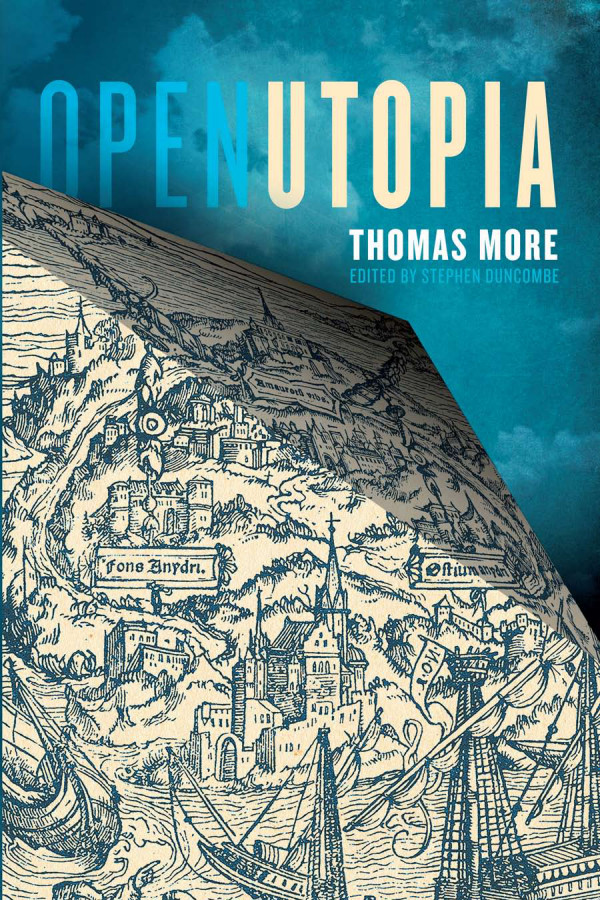Thomas More: Open Utopia (1516/2012)
Filed under book | Tags: · politics, religion, society, utopia

Opinion polls, volatile voting patterns, and street protests demonstrate widespread dissatisfaction with the current system, yet the popular response so far has largely been limited to the angry outcry of No! But negation, by itself, affects nothing. The dominant system doesn’t dominate because people agree with it; it rules because we’re convinced there is no alternative.
We need to be able to imagine a radical alternative – a Utopia – yet we are haunted by the disasters of “actually existing” Utopias of the past century, from fascism to authoritarian socialism. In this re-issue of Thomas More’s generative volume, scholar and activist Stephen Duncombe re-imagines Utopia as an open text, one designed by More as an imaginal machine freeing us from the tyranny of the present while undermining master plans for the future.
Open Utopia is the first complete English language edition of Thomas More’s Utopia that honors the primary precept of Utopia itself: that all property is common property. Open Utopia, licensed under Creative Commons, is free to copy, to share, to use. But Utopia is more than the story of a far-off land with no private property. It is a text that instructs us how to approach texts, be they literary or political, in an open manner: open to criticism, open to participation, and open to re-creation. Utopia is no-place, and therefore it is up to all of us to imagine it.
In this volume, and its accompanying website, Utopia is re-imagined and brought into the digital age as a participatory technology for undermining authority and facilitating new imagination.
Edited and With an Introduction by Stephen Duncombe
Publisher Minor Compositions, Wivenhoe/New York/Port Watson, an imprint of Autonomedia, NY, 2012
Creative Commons Attribution-ShareAlike 3.0 Unported License
ISBN 9781570272455
242 pages
PDF
View online (from the publisher)
Speculations: Journal of Speculative Realism, No. 3 (2012)
Filed under journal | Tags: · non-philosophy, philosophy, religion, speculative realism, theory

Speculations: A Journal of Speculative Realism is an open-access, peer-reviewed journal that provides a forum for the exploration of speculative realism and post-continental philosophy.
“This is a leviathan whale of an issue [510 pages!] comprising articles (by Benjamin Norris, Beatrice Marovich, Levi Bryant, Daniel Whistler, Daniel Colucciello Barber, Christopher Norris, and Michael Haworth), position papers (by Christian Thorne and Peter Wolfendale), translations (Graham Harman’s “On Vicarious Causation” into German, for example), reviews (of Levi Bryant’s The Democracy of Objects, Graham Harman’s Circus Philosophicus, Christopher Watkin’s Difficult Atheism, Andy Merrifield’s Magical Marxism, and Joseph Nechvatal’s nOise anusmOs installation), and an interview with Stathis Psillos. Those interested in the ongoing struggles to define exactly what Speculative Realism (SR) is, will want to read the translation of Louis Morelle’s comprehensive “Speculative Realism: After Infinitude and Beyond?” also included in this issue.” (publisher)
Editors: Michael Austin, Paul J. Ennis, Fabio Gironi, Thomas Gokey, Robert Jackson
Publisher punctum books, September 2012
Creative Commons license
ISBN 978-0988234017
510 pages
PDF (single PDF)
PDF (PDF articles)
Alberto Toscano: Fanaticism: On the Uses of an Idea (2010)
Filed under book | Tags: · history, philosophy, politics, psychoanalysis, religion

A genealogy of fanaticism—unearthing its long history, before it became a tool in the Clash of Civilizations.
The idea of fanaticism as a deviant or extreme variant of an already irrational set of religious beliefs is today invoked by the West in order to demonize and psychologize any non-liberal politics. Alberto Toscano’s compelling and erudite counter-history explodes this accepted interpretation in exploring the critical role fanaticism played in forming modern politics and the liberal state. Tracing its development from the traumatic Peasants’ War of early sixteenth-century Germany to contemporary Islamism, Toscano tears apart the sterile opposition of ‘reasonableness’ and fanaticism. Instead, in a radical new interpretation, he places the fanatic at the very heart of politics, arguing that historical and revolutionary transformations require a new understanding of his role. Showing how fanaticism results from the failure to formulate an adequate emancipatory politics, this illuminating history sheds new light on an idea that continues to dominate debates about faith and secularism.
Publisher Verso, 2010
ISBN 184467424X, 9781844674244
277 pages
review (Steven Poole, The Guardian)
review (Evgeni V. Pavlov, Rethinking Marxism)
review (Tom Eyers, Marx & Philosophy Review of Books)

